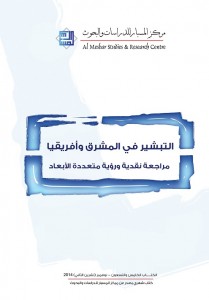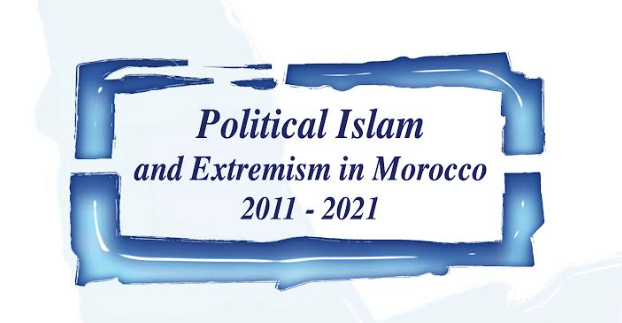 Al-Mesbar Center’s 95th monthly book explores the relationship between Christian missionary activity and Western colonialism in the Arab world, their influence and legacy, and the interplay of competing Western powers and differing Christian sects within the region. It also shows how the relationship evolved between the missionaries and the societies in which they preached —leading, in some cases, to a desire on the part of converts to Christianity to turn against the missionaries who had converted them. Missionary activity in the region, as in other parts of the world, was not solely directed toward non-Christians such as Muslims and Jews; it was also aimed at indigenous Christian sects whom it deemed to be misguided — as some of the studies from Iran, Lebanon, and Syria will show. A portion of the book also examines present-day missionary efforts that use Arabic-language satellite television to reach a mass audience. We also deemed it important to include a chapter exploring international norms and laws with respect to the principle of religious freedom.
Al-Mesbar Center’s 95th monthly book explores the relationship between Christian missionary activity and Western colonialism in the Arab world, their influence and legacy, and the interplay of competing Western powers and differing Christian sects within the region. It also shows how the relationship evolved between the missionaries and the societies in which they preached —leading, in some cases, to a desire on the part of converts to Christianity to turn against the missionaries who had converted them. Missionary activity in the region, as in other parts of the world, was not solely directed toward non-Christians such as Muslims and Jews; it was also aimed at indigenous Christian sects whom it deemed to be misguided — as some of the studies from Iran, Lebanon, and Syria will show. A portion of the book also examines present-day missionary efforts that use Arabic-language satellite television to reach a mass audience. We also deemed it important to include a chapter exploring international norms and laws with respect to the principle of religious freedom.
The book comes at a time of metastasizing intolerance in the region and, consequently, a weakening of the ethos of pluralism. It is also a time of hope, however — as rising voices in numerous Arab countries signal their rejection of intolerance; new campaigns strive to promote pluralism and spread a culture of inclusiveness; and new laws in the offing would aim to ban hate speech. Those who wage these campaigns stand particularly to benefit from this book: They can learn more about the history and nature of missionary activity in the region, as well as debunk canards about indigenous Christian communities. With respect, for example, to the charge that Christians in Arab countries are agents of foreign powers, readers will discover that to the contrary, many Christians in the Arab world were fervent nationalists, who struggled alongside Muslims against European colonialism.
One might be concerned that in these trying times, a book which also examines some of the negative aspects of the legacy of missionary activity in the region may be antithetical to calls for tolerance and pluralism — particularly as several contributors to this volume believe that missionary activity was driven by Christian hostilities toward Islam. From our perspective, however, we aim in publishing this volume to advance the cause of pluralism, in three respects:
First, we would like to pave the way toward more objective scholarship on the history of missionaries in the Arab world, supplanting the highly charged, polemical writing in our region that is fundamentally biased against Christians. That body of work typically characterizes Western missionaries as well as indigenous Christian communities as agents of foreign elements that only served colonial powers. While it is true that some missionaries served imperialist projects, others functioned independently of government, and still others worked to advance a hybrid agenda that balanced the interests of their governments with purely religious or humanitarian goals. Meanwhile, in our view, local Christians were for the most part autonomous actors and to the extent they acted politically, they did so in the context of the tensions of local politics at the time.
Second, we feel that a culture of pluralism must be built on honesty about the past, with all its positives and negatives. We cannot speak about co-existence between sects and religions without also coming to terms with the more troubling aspects of our shared history. By recognizing and acknowledging past mistakes, we can help ensure that they not be repeated. The past can be remembered in two ways: one that exacerbates intolerance, and another that defuses it. We seek the latter.
Third, with respect to converts to Christianity, it is common in Arab countries to believe that locals who embraced the faith became agents of colonialism or the Western establishments that had converted them. We believe that for the most part, this is factually wrong. The studies here try to show the complex relationship among the parties involved: Many converts were fully aware of colonialist attempts to manipulate their adoption of the Christian faith, and chose instead to resist colonialism. The book also shows that many converts were keen to seek autonomy from Western churches. Thus the book shows that the success of missionary activity did not necessarily advance or prolong foreign imperialism in the region.
The book also reveals a subtle but important fact with respect to the phenomenon of conversion whose acknowledgment can help heal some of the region’s historic rifts: While pointing out that many new converts sought colonial support, it also shows that they did not necessarily do so for the purpose of sustaining colonialism. The alliance of some new Christians with colonialists against certain Muslims was often similar in nature and outcome, for example, to alliances among some Muslims against other Muslims. Persons of numerous faiths who opposed colonialism in principle nonetheless reached arrangements with colonialists in practice in order to benefit themselves or the common good. Without imposing judgment on these choices, we simply point out that Christians were not alone in cooperating with colonialism. Singling out Christians for criticism along these lines is a technique used by forces of intolerance in our region which needs to be stopped.
We are not unaware of the negative outcomes of missionary activity in the region, nor of the many outstanding contributions missionaries made in education, health services, and other realms — indeed, a tradition that is carried on by Christian NGOs today who serve Muslims in dire need, often at great risk to themselves. We seek to understand the totality of the outcome as clearly as we can, and to re-frame it as a complex phenomenon with multiple dimensions rather than reduce it to binary conflicts of West vs East, or Christians vs Islam.
As always, the Center would like to extend its gratitude to all the contributors who made this book possible, especially Rita Faraj, who coordinated and oversaw its production.









